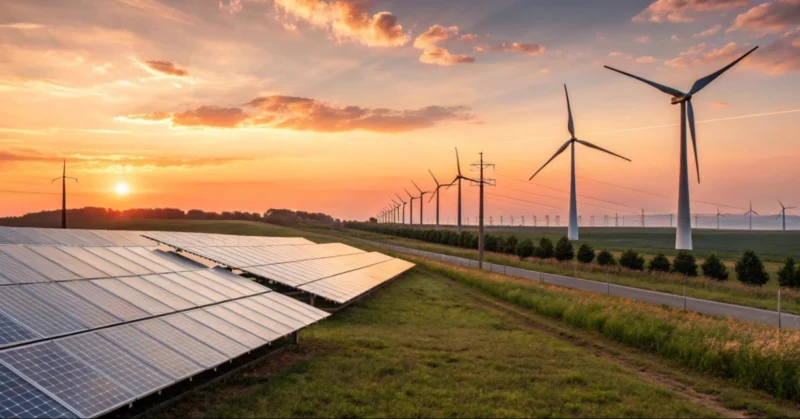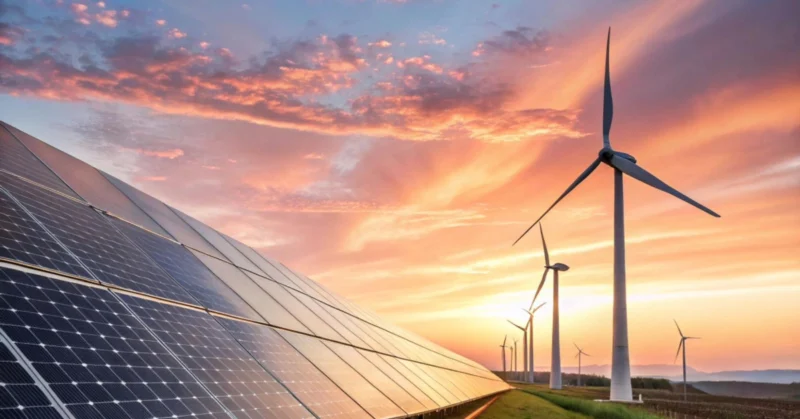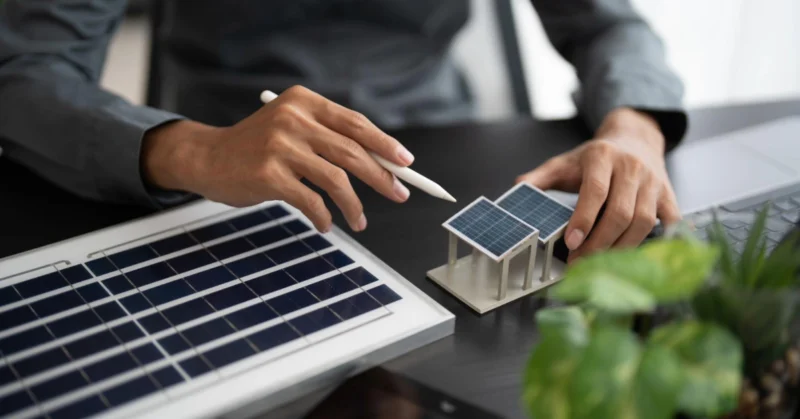Are you tired of electricity bills as a homeowner in the UAE? It might be time to look into solar energy to power your home and reduce your carbon footprint. Thanks to strong government support and a growing interest in green living, many residents across the country are switching to solar power.
Whether you want to save money, reduce your reliance on the grid, or invest in your property’s value, solar power is a smart choice for you. In this guide, you’ll learn what’s required, how installation works, costs, and more.
- Why solar makes sense
- How Shams Dubai works
- Eligibility
- DEWA regulations
- Required documentation
- Installation process
- System size and power output
- Cost and financing
- Maintenance and support
- Key takeaways
- FAQs

Why solar makes sense in the UAE
There’s no shortage of sunlight in the country. With around 10-12 hours of sunshine daily, your rooftop has serious potential. Here’s why many homeowners are making the switch:
- Cutting bills: Offset your DEWA usage and pay less each month
- Eco-living: Reduce your carbon footprint and do your bit for the planet
- Energy control: Use your own power and depend less on the grid
- Boost value: Homes with solar often appeal to future buyers
It’s a long-term investment, but it pays off faster than you might think.
How Shams Dubai works
If your home is in Dubai, you’ll deal with Shams Dubai, a solar initiative by DEWA (Dubai Electricity and Water Authority). The programme lets you connect your solar system to the grid through net metering.
Here’s how it works: You generate power during the day through your solar panels. You use what you need, and any extra goes back to the grid. Later, when you need more power than your panels generate (like at night), DEWA credits your account based on the surplus you supplied.
It’s a win-win as it allows you to use clean energy and save money.
Eligibility
You’re eligible if you’re a property owner with enough roof space. You’ll need to work with a DEWA-approved solar contractor. They’ll assess your home, handle all the paperwork, and make sure your system meets the technical requirements.
DEWA regulations
Before jumping in, there are a few rules to understand. These ensure your system is safe, efficient, and compatible with DEWA’s network.
System size limits
You can’t install as many panels as you like. DEWA limits the size of your solar system based on your Total Connected Load (TCL), which is how much electricity your property typically uses. The higher your TCL, the more solar capacity you can install. Besides, your approved contractor can calculate this for you.
Where can you install panels?
DEWA allows installations on:
- Rooftops
- Facades or building exteriors
- Carports and shade structures
Ground installations aren’t usually permitted for residential buildings in Dubai.
Approved equipment only
DEWA has a list of approved solar panels, inverters, and protective devices. Your installer will help you choose equipment that meets all technical standards.

Required documentation
While your contractor will do most of the legwork, it’s important to know what paperwork is involved. Here’s what they’ll typically submit:
- A site plan showing where the panels and inverter will go
- Electrical diagrams (such as single-line wiring layouts)
- Technical specifications of all equipment
- An agreement for grid connection
- DEAW and municipality applications (as needed)
Once approved, you’ll get a No Objection Certificate (NOC) from DEWA, giving you the green light to move forward with installation.
Installation process
The process is smoother than most people think. Here’s how it usually goes:
- Get a DEWA-registered consultant: They assess your home and energy use.
- Submit the design: This includes all technical drawings and documents.
- Approval and fees: DEWA approves the system and provides a fee estimate.
- Install the system: Typically takes 3 to 7 days for residential properties.
- Final inspection: DEWA visits your property to verify compliance.
- Meter setup: A smart meter is installed so you can export energy back to the grid.
- Switch on: Once everything checks out, your system goes live.
You’ll be generating power from your own rooftop in no time.
System size and power output
The system size depends on a few things:
- Your home’s energy use
- Your TCL
- Available rooftop space
- Your future energy needs
Most homes in the UAE install systems ranging from 4 kW to 12 kW. Your contractor will design the right size based on your connected load and consumption.

Cost and financing
Prices have come down in recent years. This is due to better technology and more competition among installers.
Here’s a ballpark estimate for typical homes in the UAE:
| System size | Approx. cost (AED) |
| 5 kW | 20,000 – 30,000 |
| 10 kW | 35,000 – 50,000 |
| 15 kW | 60,000 – 80,000 |
These costs include equipment, labour, permits and DEWA fees. The final price may vary based on your contractor’s reputation, roof type, components, or any extra work needed.
While these seem like big numbers, net metering helps offset these costs. Your DEWA bills drop significantly, and over time, those savings add up. Most homeowners recover their costs in four to eight years.
Most people pay upfront. However, some banks and solar companies offer financing plans or green loans. Ask your contractor about your options. DEWA’s net metering also reduces the payback period.
Maintenance and support
Solar systems usually don’t need much maintenance, but the UAE’s dusty conditions mean regular cleaning is important.
You need to stay on top of:
- Cleaning: Dust can reduce performance. Monthly or bi-monthly cleaning helps.
- Annual checks: These help make sure your inverter, wiring and safety systems are working properly.
- Monitoring: Most systems come with apps that you can use to track performance.
Ask your contractor about a maintenance package so they can take care of maintenance for you. With proper care, systems can last 25 to 30 years.
Benefits
There are many benefits to having a sustainable solar-powered residence, as follows:
Financial advantages
- Reduce your monthly electric bill
- Increase in your property’s value
- Decrease dependence on the grid and protect yourself from future rate hikes.
Other advantages
Yes, you’ll save money. But there is more to solar than just cost.
- Help reduce reliance on fossil fuels.
- Cutting carbon emissions.
- Setting an example in your community.
- Investing in a cleaner future for your family.
- Supporting the UAE’s New Zero 2050 initiative.
Key takeaways
Installing solar panels on your home in the UAE isn’t as complicated as it might seem. You’ll need a permit from DEWA, and your system must follow the latest rules on size and placement. Most solar systems are installed on the rooftop, and range between 4 kW and 12 kW.
Additionally, the price varies depending on your system size, equipment, and setup. Most homeowners spend between AED 45,000 and AED 100,000. While it may seem like a big number, net metering offsets these costs. Families recover their investment within four to eight years through reduced electric bills.
The installation is straightforward. You’ll choose a DEWA-approved contractor, who will take care of design, permits, paperwork and installation. Once installed, DEWA inspects the system. If it passes, they connect it to the grid so your home can start using solar power right away.
The benefits go beyond saving money. You can lower your electricity bill, increase your home’s value, and support the UAE’s long-term sustainability goals.
FAQs
Yes, a permit from DEWA is mandatory for all installations.
The maximum grid-connected system size is currently 1 MW.
No, only rooftop, facade, or existing structure installations are allowed under current rules.
You can expect to pay approximately AED 20,000 – 35,000, depending on the contractor and equipment.
Yes, under the Shams Dubai net metering program, you can export surplus and earn credits.